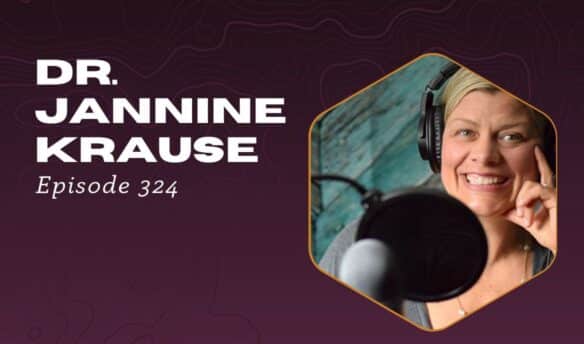Magnesium is a common mineral deficiency in all ages.
Let’s face it veggies and fruit, your natural sources for magnesium, are often under consumed as it takes time to wash, cut and prepare them.
With busy lives it’s often easier to eat convenience foods versus prepare your own meals.
Unfortunately, the soil your produce is grown has less minerals, such as magnesium, in it than a decade and far less than a century ago.
So even if you eat sufficient fruits and veggies your likely still missing out on much needed magnesium.
Signs of magnesium deficiency:
- Anxiety
- Heart palpitations
- Muscle cramps and spasms
- Migraines
- Irritability
- Premenstrual syndrome
Magnesium deficiencies are not assessed with regular labs.
You can request your doctor to check your red blood cell magnesium levels by taking a blood sample.
Glycine and magnesium are needed to keep your muscles healthy, and prevent aches and pains.
Check out a podcast of the previous episode here, to learn about glycine deficiency.
Why is Magnesium Important?
Magnesium is used by every organ in our body.
- There are over 3700 binding sites for magnesium.
- There are over 300 protein enzymes for detoxification that utilize magnesium. It helps us to detoxify from environmental toxins. It also gets rid of heavy metals in the body.
- Magnesium activates the nervous system.
- Magnesium helps us to create ATP energy. If we’re blocking magnesium, we can’t get certain steps to happen in the cycle to create energy, which can result in fatigue.
- Magnesium helps us digest fats, proteins, and carbohydrates. If mineral absorption is being blocked, we cannot create energy or digest the food we are eating.
- Helps us to repair our muscle tissue and cells. In particular it helps us with DNA and RNA creation.
- We also use magnesium to create serotonin. Serotonin is our happy hormone. Without magnesium, the serotonin boosting supplements cannot be converted into the serotonin our bodies need.
What Causes Magnesium Deficiency?
It’s reported that about 75 percent of all adults don’t get enough magnesium.
It’s possible that you are blocking your absorption of magnesium.
If you drink caffeine you are going to block magnesium absorption.
Certain medications, such as insulin or diuretics, can also block magnesium absorption.
If you have high levels of circulating insulin because your blood sugar runs high you also block magnesium absorption.
Corticosteroids, elevated cortisol levels due to stress and antibiotics also block your ability to absorb magnesium.
Another major player in blocking mineral absorption is glyphosate, an herbicide that is used on crops, which is heavily used on wheat.
So, even if you are eating your dark leafy greens, that should be rich in magnesium, if they’re not grown organically then glyphosate will block your body’s ability to absorb magnesium.
Another culprit in magnesium deficiency is calcium.
You might have heard that you need loads of calcium for strong bones, but there’s no talk about magnesium’s role in bone health.
Supplementing Magnesium
The recommended daily allowance for magnesium is 320 milligrams for ladies and 420 milligrams for men.
You would have to eat quite a bit of veggies to get that in.
Foods rich in magnesium include, dark leafy greens, such as spinach and chard.
Pumpkin seeds, yogurt, almonds, black beans, avocado, figs, and dark chocolate are also great sources of magnesium.
If your digestive system isn’t functioning properly you might not absorb the minerals and nutrients you need.
It’s important to first work on cleaning up your diet, ridding yourself of toxins, and then fill up on magnesium rich foods.
Supplements can be a great way to ensure you’re getting the right amount of magnesium.
There are several different types of magnesium that can help you out in different ways:
Magnesium Citrate
It’s the most common type of magnesium out there.
The biggest issue with magnesium citrate is that it’s a laxative.
If you have issues with constipation, this could be a good way to go.
Magnesium citrate is also linked to aiding those with anxiety and insomnia.
Start out with 150-300 mg of magnesium citrate and see how your digestive system does.
Magnesium Glycinate
Magnesium glycinate is absorbed by the body very well.
It’s perfect for correcting general deficiencies of magnesium.
This type of magnesium has a relaxing effect and can be taken before bed to aid in sleep.
Start dosing between 400-800 mg a day.
Magnesium Malate
If you’re having muscle spasms or difficulty recovering from workouts consider magnesium malate.
Dose between 300-1,000 mg a day
Magnesium Threonate
This magnesium is great for nerves, dementia, mood issues, PMS, and migraines.
Magnesium threonate is also very effective for fatigued cells, so if you’re having trouble losing weight or have a slow metabolism, this is the best magnesium to go with.
The supplements that I prefer are Designs for Health’s Buffered Magnesium and Xymogen’s OSAPlex MK-7. These in particular are great for muscular issues.
If you are experiencing issues with the nervous system, such as numbness, tingling, mood changes, PMS, or struggling with brain fog then OptiMag Neuro is the supplement I recommend.
If you aren’t interested in taking supplements, I highly recommend an epsom salt bath every day.
Epsom salt baths are a great way to end the day, calm the muscles and absorb some magnesium from the epsom salt.
It’s Time to Try Some Magnesium
If you have any symptoms that might be related to magnesium deficiency it’s time to consider testing.
Trying to get magnesium from your diet is hard and with stress, medications and blood sugar issues possibly blocking consumed magnesium from being absorbed it’s time to consider supplementing with magnesium.
Whether or not your test for a magnesium deficiency you can follow the tips in this blog to help address the suspected deficiency and get you to feeling your best.
What are you waiting for?
If you enjoyed this blog post Dr. Jannine Krause has a podcast dedicated to this subject. Click HERE to listen to Dr. Jannine Krause’s podcast on magnesium deficiencies.
youtube





